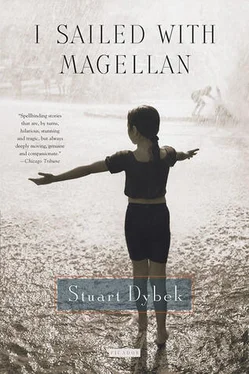“Picture the shades along the route in the apartment buildings that face the tracks, all drawn, golden in the sun, no other window standing open like yours. It’s two in the afternoon and the city feels almost deserted, everyone at work or school, and here she is alone on an Indian summer day, coat off, a lilac bra visible through her white blouse, which is reflecting light like a golden shade. Usually you raise it slowly, but sometimes let it fly from your hand.
“She never goes the back-alley way, even though she believed it when you told her that it’s a Paris street by night. She’s loyal to the way she came the first time, when she felt a little lost. Can you imagine what she felt — the crazy chance she was taking?
“Do you believe she actually came — walked past the phantom doorman, past the desk clerk, who, if there was one, would be dressed in black like the desk clerk in ‘Heartbreak Hotel’—you know, the one who’s ‘been so long on lonely street’ he’ll never come back. And the bellboy in his little suit would be a wizened old man by now.
“The dusty lobby doesn’t need phantoms, it has gutted mailboxes instead. You complain that you never get any mail. Could it be that’s because you haven’t bothered to tape your name to one of those mailboxes still scrawled with the names and numbers of people who lived here years ago? If you had a mailbox, you’d find this there, rather than slipped under your door.
“She climbs the stairs with their carpeting worn from countless footsteps, some of them hers from earlier visits, and makes her way down a corridor that’s dark even in midday. Do you believe this story — you who were so worried to find yourself in Chapter One, as though beginnings aren’t always the best part?
“Consider this a letter, although it’s turning into a flashback. Doesn’t every novel need one? Do you have them after she’s gone? What words do you use to describe the two of them when you think of times together like that afternoon it stormed?
“This flashback is like a déjà vu I have each time I climb the stairs again: an image of that woman, standing as she did the first time, wondering whether to knock, listening at your door. On the other side she can hear wind, an El train going by, chiming bells, an interval of silence played by a saxophone at rest.”
The afternoon it stormed, it seemed as if we were able to make the rain go faster. Her moans like a countdown; her lilac-painted fingernails pinching her pink nipples. Had she painted them to match her bra?
There seemed always something new to invent between us; even after she’d gone there was always one more thing I wanted to tell her.
I wanted to tell her what I’d heard on the night it turned cold — the kind of crisp, breath-steaming cold that I’d sometimes tried to imagine during days back at the foundry in Memphis. In summer, the workday there would begin at five in the morning, an attempt to deal with the heat; by nine we’d be popping salt tablets.
Shivering on the flop-out bed, wound in the bedspread, I was trying to read to the sound of Mr. Davi, the Albanian janitor, who labored to get the heat going. I pictured him in the furnace room whacking with a crowbar, as if he could beat the stubborn old furnace into action. On one occasion when I’d been doing my laundry in the basement, Davi showed me his collection of the flotsam he’d skimmed from the garbage he hauled — skin magazines, compromising photographs, torn panty hose. Having shared this confidence, he wanted to know about college girls.
“I should have gone to college and become a doctor or an engineer, but I came to America instead and now look,” he said with the corrosive bitterness of a man employed below his station.
Davi and his family lived in the basement apartment, behind what sounded like a half dozen locks, as if they were expecting the KGB. At least it felt that way the one time I’d knocked on his door to ask if he could come up and help me get the window unstuck. It was Melody’s theory that Davi pounded the pipes to convince the tenants the cold radiators were on—“the psychosomatic heat of the Loyola Arms” she called it. She called him “Salvador Davi, the surrealist janitor” after he’d opened the door on us one afternoon.
I wasn’t even aware it had happened until, later, Melody said, “You’re a cool customer.”
“What do you mean?” I asked. Cool was hardly the way I felt toward her.
“The janitor comes in and you don’t miss a beat.”
“Mr. Davi?”
“Who else? A paunchy guy with a mustache, standing there with a crowbar. I waited for you to say something. He just stood with his mouth open watching us mating, and finally gave this apologetic little bow and turned and went quietly out the door. You didn’t notice?”
“You think I would have simply continued?”
“See, I misread you. You are a romantic after all.”
Wrapped in a bedspread, listening to the psychosomatic heat that first night in fall, when the wind off the lake smelled of its glacial past, I recalled a grade school day in Indian summer. I was returning to school from lunch, taking a meandering roundabout way and trying to work up the nerve to cut that afternoon and hang out on the railroad tracks with Angel and Stosh, when I saw the alkies were back. They’d been away. Trucks from Manpower would come to the neighborhood every fall and take them off to Michigan to pick apples. Now they were back with bags of apples and money for booze, gathered around a hydrant that trickled along the side street of broken glass where old cars were dumped. Some of them lived there during the summer, sleeping in junked cars the way campers might use a tent. The street dead-ended in the 3 V’s Birdseed Factory, and from the factory’s screened windows came the exotic cries and chatter of parakeets, canaries, mynahs, and Java birds singing out, perhaps in response to the excited twittering of sparrows who were bathing in the sky-reflecting pond that spread from the hydrant. Some of the alkies were bathing, too, mopping water-soaked kerchiefs over their heads. I watched them awhile, then headed for the railroad tracks.
I wanted to tell her how, when the radiators stopped their metallic knocking, I’d heard another dull pounding — one I hadn’t heard for over a week — and I’d begun to wonder if I’d ever see Melody again. It was the old woman in the flat below, banging with her broom handle the way she did those afternoons when Melody would come over and we’d end up in bed. This time, alone, I sat perfectly still upon the bed. Thump, thump, thump, it continued, as if the woman downstairs was trying to communicate through some code. I decided that if she was healthy enough to stand on a chair and pound the ceiling with a broom, then it wasn’t an SOS. Maybe she was simply a little cracked, like whoever had that voice I could hear traveling up the pipes in my bathroom late at night keening the same nearly unintelligible phrase—“Don’t you wanna, don’t you wanna”—although it could just as well have been someone calling a name — Donna — over and over.
Night brought out moans like that in the old hotel, sounds I hadn’t noticed at first, growls of insatiable hunger from the guts of the place. Maybe they were ghosts; maybe they were flashbacks left behind. If so, I had my own to contribute: the way Natasha looked that afternoon when we heard the windblown slant of rain beating glass panes and pattering the linoleum in the kitchen. “As if the floor was tile,” she said later. Racing against my ear, her breath became part of the hiss of rain, her hands rose to her breasts, pinching her nipples, making herself cry out again and again. True or not, I wanted to tell her that I knew why the old lady pounded the ceiling. Because she was lonely, and what we’d assumed were raps of disapprobation had actually been applause.
Читать дальше












